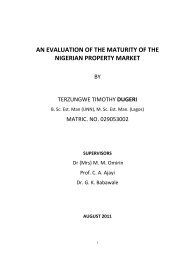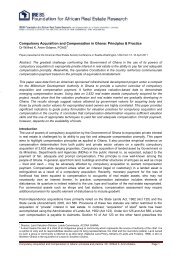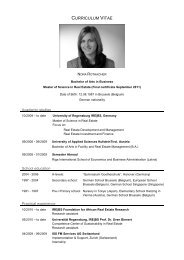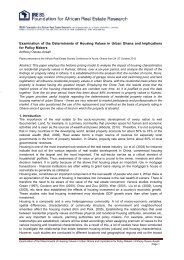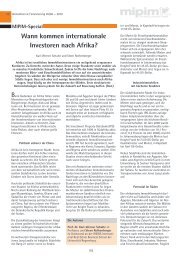You also want an ePaper? Increase the reach of your titles
YUMPU automatically turns print PDFs into web optimized ePapers that Google loves.
34year of assessment;gains of a company from a merger, amalgamation or re<strong>org</strong>anisationof the company involving the continuedunderlying ownership in the asset;gains from a transfer of ownership of an asset betweenformer spouses in a divorce settlement or a separationagreement;gains where the amount received on realization is used toacquire a chargeable asset of the same nature within oneyear of realization.Stamp DutyUnder the Stamp Duty Act no instrument that is subject to stampduty is enforceable, or admissible in court as evidence if thedocument is not stamped. The Act sets out various ratesapplicable to specific matters or instruments.Exchange ControlsGhana operates a floating exchange rate system. The ForeignExchange Act has abolished exchange controls at thetransactional level. Banks have to report foreign currencytransactions to the central bank. The liberalised law and the welldeveloped banking system and privately owned forex bureaux aswell as money transfer <strong>org</strong>anisations make for easy conversionand transfer of foreign currency in and out of Ghana.An individual may operate a foreign currency account with banksin Ghana. Investments to which the GIPC Act applies are assuredof unconditional transferability of personal remittances ofwages through authorised dealer banks and the freetransferability of dividends and profits.SecuritiesA person may invest in shares, debentures, bonds and treasurybills. Under the Securities Industry Law, an entity dealing insecurities must be a body corporate and must obtain a Dealer’sLicence from the Securities Regulatory Commission, the GhanaStock Exchange and the Bank of Ghana and is obliged to maintaincertain minimum capital requirements.Non–residents may invest in securities listed on the Ghana stockexchange. There are however limits on non-residents investingin certain industrial sectors. For example, the purchase of 10% ormore of the securities of a bank requires the prior approval ofthe Bank of Ghana.Securities may be listed through any of the following means:Prospectus issue;Offer for sale;Placing;A rights offer to holders of security;An open offer to holders of rights;Capitalisation issues to holders of securities;An issue of securities arising out of the conversion ofconvertible securities.The process of settlement, including registration of certificates,its issuance and sale of securities, must be completed three daysafter the trading. Payment shall be made strictly against delivery.When a non-resident purchases securities onthe stock exchange, settlement is completedby the seller lodging the transfer documentswith the registrar and the buyer shall arrangefor the release of funds. In the event of afailure by a Licensed Dealing Member (LDM) to deliver thecertificates, the buyer’s recourse would first be against theselling LDM. Where sanctions apply, the interest charged will bepaid to the buyer and the penalty paid to the Ghana StockExchange.When a non-resident sells securities the Selling LDM will issue acertified true copy of the certificate to be lodged with theRegistrar. The Registrar will then issue the appropriate transferreceipt to the selling broker to enable him to clear thetransaction with the buying broker and receive settlement for it.The selling broker shall pay the seller and collect the originalcopy of the certificate and submit the certificate to thepurchaser within 24 hours. Failure to return certificates withinthe statutory period will be penalised.Takeover of a company listed on the Ghana Stock Exchange is bymeans of a takeover offer. The bidder must carry 30% or more ofthe total voting rights of the target company in order to make anoffer.Intellectual PropertyGhana is a party to the Berne Convention for the Protection ofLiterary and Artistic Works, the Paris Convention for theProtection of Industrial Property, the World Intellectual PropertyOrganisation (WIPO), the Patent Cooperation Treaty (PCT), theWorld Trade Organisation (WTO) TRIPS agreement, the LocarnoAgreement establishing an International Classification forIndustrial Designs and the Harare Protocol. Ghana has signedbut has not ratified the WIPO Performances and PhonogramsTreaty and the WIPO Copyright Treaty.Ghana has within the last three years passed six intellectualproperty statutes namely the Trademarks Act, Patents Act,Industrial Designs Act, Layouts - Designs (Topographies) ofIntegrated Circuits Act, Geographical Indications Act, and theCopyright Act.The Trademarks Act is a comprehensive modification of therepealed Trademarks Act 1965 (Act 270) Act to keep pace withdevelopments in trading and commercial practices and tomodernize the legislation of trademarks to comply withinternational obligations under the TRIPS Agreement. Toachieve this purpose, the Trademarks Act has incorporated thefollowing changes:registration of service marks;a single register instead of the previously existing marks ineither Part A or Part B;extending the period of renewal of trademark registrationfrom seven to ten years; andaction in respect of transshipped goods.The registration of a trademark is valid for ten years from thedate of filing the application and is renewable for a further term.A patent has a term of twenty years from the date of filing of theapplication. Annual fees are paid in advance. Where an annualfee is not paid, the application will be deemed to have beenwithdrawn or the patent will lapse.The new Copyright Act expressly provides for protection ofcopyright without the requirement of registration. The term ofprotection of copyright has been increased to seventy yearsfrom fifty years. The rights of the author if he is an individual are




